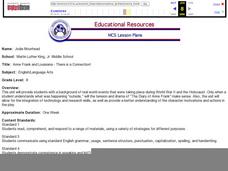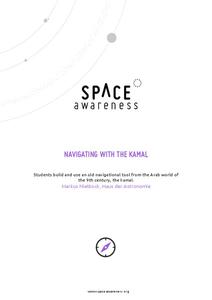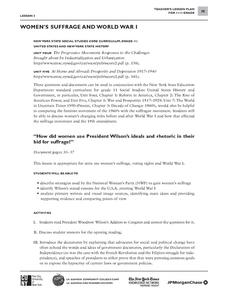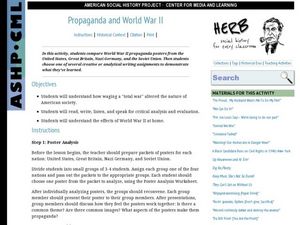National Park Service
The Young Naturalist
Beginning with a brief history of our 26th president, Theodore Roosevelt, then followed by a discussion of his interest in nature, young scientists take to the outdoors to locate and observe local plants and insects. Scholars return to...
American Institute of Physics
The Tuskegee Weathermen: African-American Meteorologists during World War II
Chances are good that young scholars have heard of the Tuskegee Airmen but few would predict that these pilots had their own support in the form of the Tuskegee Weathermen. These Black meteorologists were recruited and trained to provide...
National Endowment for the Humanities
American Utopia: The Architecture and History of the Suburb
Let's build a dream house! By examining promotional materials and photographs of early suburban developments, scholars consider what led to the development of this particular American dream. The resource includes case studies of three...
Curated OER
Bill Robinson: Mr. Bojangles
Mr. Bojangles was born just after slavery was abolished and became one of the most beloved entertainers of his time. Explore key vocabulary, the life of an African-American entertainer, and the impact of the Harlem Renaissance on...
Curated OER
Anne Frank and Louisiana - There is a Connection!
How is Louisiana connected to the Holocaust? After reading The Diary of Anne Frank, eighth graders complete a research report about a survivor of the Holocaust who currently resides in Louisiana. Though the idea is a good way to connect...
Space Awareness
Navigating with the Kamal
Historians have proven that as early as 1497 skilled navigators were using a kamal to sail across oceans. Scholars learn about navigation tools and astronomy before building their own kamals. They then learn how to use it to determine...
Alabama Department of Archives and History
Inside the Wire: Internment of Prisoners of War in Alabama during World War II
Create an open environment of discussion and collaboration with several exercises in a thought-provoking resource. Pupils conduct a gallery walk and lead a discussion before filling out a question sheet and chart during the learning...
City University of New York
Woman's Suffrage and World War I
How did women use President Wilson's ideals and rhetoric in their bid for suffrage? To answer this essential question, class groups analyze primary written documents and visual images.
National Woman's History Museum
Real Life Rosie the Riveters
There was more than one Rosie the Riveter. To learn more about the contributions women made to the World War II war effort, groups become expert on different "Rosie" and share their findings in a Jigsaw activity. The lesson concludes...
National Woman's History Museum
Rosie the Riveter: The Embodiment of the American Woman’s Economic and Social Awakening
Critical events force change. World War II forced a change in perceptions of and attitudes toward women. When thousands of men joined the military American factories were left shorthanded. Young historians investigate how media was used...
National Woman's History Museum
Congresswoman Jeannette Rankin
Political activist, suffragette, pacifist, and the first woman elected to Congress, Jeannette Rankin has been largely ignored in history and history textbooks. Young historians set out to rectify that situation by examining primary...
Museum of Tolerance
The Role of Citizens in a Participatory Democracy
Groups research participatory democracies and compare the role and rights of citizens in ancient history with those in recent U.S. history. Guided by a series of questions, individuals compose a persuasive essay in which they discuss the...
US Holocaust Museum
Defying Genocide
Defying death. Defying those who want to do harm. Defying genocide. Pupils research the events in Rwanda to gain an understanding of what it takes to survive a horrific event like a holocaust. They use video, time lines, and Holocaust...
Curated OER
Propaganda and World War II
What was the true meaning behind WWII propaganda posters? Historians analyze images from the U.S., Great Britain, Nazi Germany, and the Soviet Union, sharing findings in small groups. A poster analysis worksheet and all posters are...
Museum of Disability
Taking Visual Impairment to School
What is the world like when you can't see, or when your vision is impaired? Learn about how Lisa communicates with the world around her with Taking Visual Impairment to School by Rita Whitman Steingold. Learners answer discussion...
Northern Nevada Council for the Social Studies
What Are the Origins and Influences of Rap Music?
Considered an American art form, rap has its roots in places from Jamaica to the Bronx. Using a series of readings, comprehension questions, and videos, scholars explore the history of rap and its connections to the African diaspora....
National WWII Museum
Rationing by the Numbers: Quantitative Data as Evidence
What was it like to live on wartime rations in the United States during World War II? Young historians find out by exploring how those on the home front bought food thanks to the ration system. Other data includes statistics on car sales...
American Institute of Physics
Women and the Manhattan Project
The Manhattan Project was a massive undertaking involving multiple sites and thousands of scientists and technicians. To gain an understanding of the women who participated in the project, groups select an oral history of a woman...
National Park Service
The Power of Remembrance
On every July 4th, we watch fireworks and celebrate our independence, but how is the history of the American Revolution preserved? Four social studies lesson guide learners through different memorials, commemorative objects, and restored...
Space Awareness
How To Travel On Earth Without Getting Lost
Have you ever wanted to travel the world? Take a virtual trip with a geography lesson that uses longitude and latitude, the position of the sun, an astronomy app, and a classroom globe.
Benjamin Franklin Tercentenary
Franklin’s Philadelphia: Another Point of View
While Benjamin Franklin enjoyed fame and success in colonial Philadelphia, that was not the experience of all coming to the British colonies. Young scholars trace the life of an indentured servant using a scholarly biography and reading...
Smithsonian Institution
African American Pioneers in Aviation
Bessie Coleman. William Powell. Willa Brown. Benjamin O. Davis, Jr. While these names may not be familiar to many Americans, they are African American pioneers in aviation history. Class members have an opportunity to research the...
Curriculum Development Institute
Reconstruction and Development in Japan after WWII
After World War II, Japan faced the task of rebuilding—under the watchful eyes of the Allies. Using a dice game and creative discussion strategies, class members consider the challenges facing Japan and changes the country underwent...
Curated OER
Nureyev: After Petipa
Incorporating the arts into regular classroom practices isn't an easy task. Learners will research background information regarding Russian culture, history, and conflict then see how those things have applied to the rigors of Russian...
Other popular searches
- World History Worksheets
- World History Projects
- Ancient World History
- World History Lesson Plans
- World History Africa
- Ancient World
- World History by Era
- Genocide in World History
- World History Time Line
- People in World History
- World History Eras
- World History + Chronology

























